Unit11课件教学文档
英语高考课件unit 11 32
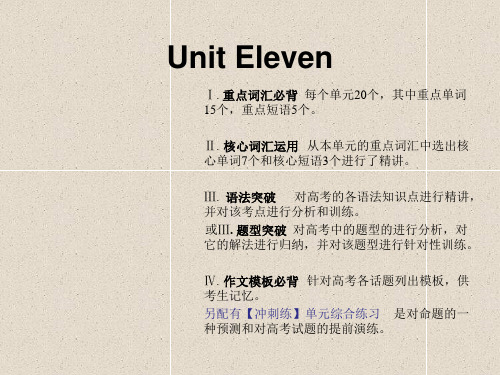
• Keys: (1) culture (2) cultural (3) cultural
2. curious adj. 好奇的;奇妙的; 不寻常的
• 构词 curiosity n. 好奇心;好奇;稀奇的人或物
• 用法 be curious about 对……感到好奇的
• 例句 The boy was curious about everything he saw.
Unit Eleven
Ⅰ. 重点词汇必背 每个单元20个,其中重点单词 15个,重点短语5个。
Ⅱ. 核心词汇运用 从本单元的重点词汇中选出核 心单词7个和核心短语3个进行了精讲。
Ⅲ. 语法突破 对高考的各语法知识点进行精讲, 并对该考点进行分析和训练。 或Ⅲ. 题型突破 对高考中的题型的进行分析,对 它的解法进行归纳,并对该题型进行针对性训练。
• The seedling was frozen _________.
6. declare [di'klεə] v. 宣言;宣布; 声明;申报
• 构词 declaration n. 宣言;宣布;申报
• 用法 declare war on a country 向某国宣战
•
declare against 宣称或声明反对
• 操练 填入适当的词组使句子完整。
• (1) 明天我将要去拜访他。
• Tomorrow I’ll __________ him.
• (2) 我们的新朋友上周曾来我们家拜访。
• Our new friends __________ our house last week.
• Keys: (1) call on (2) called at
• 用法 social custom 社会风俗
人教版七年级英语下册Unit11全章课件

针对练习 ( A ) 1.Don't
A.feed C.follow
the animals when visiting them. B.forget D.fight
2.anything的用法 anything为复合不定代词,意为“某事;某东西”时,用于疑问句; 意为“任何东西;任何事物”时,用于肯定句;意为“任何事物 都(没有)”时,用于否定句。 ·Do you want anything from me? 你想从我这里要什么东西吗? ·You can ask me anything you want to know. 你可以问我你想知道的任何事。 ·We can't believe anything he says. 无论他说什么,我们都不能相信。
B.It was boring
C.I didn't like it
D.The weather was cloudy
二、根据句意,用括号中所给词的适当形式填空。 6.I went to Guilin last summer vacation.It was excellent .(excellently) 7.My grandfather can't see anything because of his sick(生病的)
课后提升
一、单项填空。
( D )1.He told me he
a book at that time.
A.reads
B.is reading
C.was read
D.was reading
( A ) 2.She's very worried
her brother.
A.about
B.of
人教版九年级英语unit11短语句型和语法课件精品文档
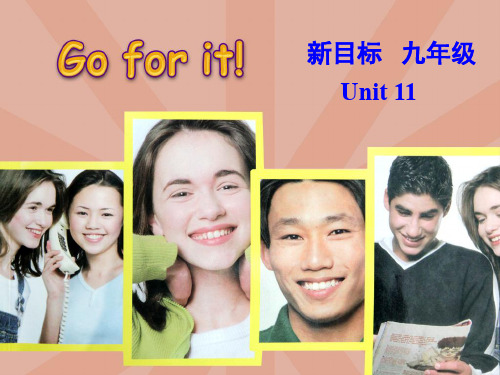
good museums in Newtown?
• 1.迷人的;有吸引力的 • 2.便宜的 • 3.方便的 • 4.安全的 • 5.孩子们会喜欢小丑城咖啡馆。 • 6. ......他们可以在农家市场里找到既美味可口
place to eat.
• 5.我决定和一些学生谈谈他们为什么去那里。 • We decided to talk to some students
about why they go there. • 6.我去购物中心是因为我的朋友们在那里闲逛。 • I go to the mall because my friends hang
• 15.每个地方的优点和缺点分别是什么? • What are the advantages and
disadvantages of each place? • 16.走大约三个街区。 • Walk about three blocks.
• 1.买洗发剂 • 2.在小河路有一家书店。 • 3.你知道我在哪里可以兑换钱吗? • 4.你能告诉我哪里有吃饭的好地方吗? • 5.我决定和一些学生谈谈他们为什么去那里。 • 6.我去购物中心是因为我的朋友们在那里闲逛。 • 7.为什么不喜欢呢? • 8.而且那里通常很拥挤。 • 9.那里有许多免费的音乐会。 • 10.我也喜欢在书店里看书。 • 11.哦,当我逛商店时,我总是花太多的钱! • 12.它有点儿小。 • 13.但邱的妈妈是一位好厨师,所以我们总能吃到美味
the restrooms a你能告诉我哪儿有洗手间吗? • 3.获取一些关于城镇的信息 • 4.打电话 • 5.向左转 • 6.乘自动扶梯到二楼 • 7.药房在家具店和书店之间。 • 8.经过银行。 • 9.你能告诉我怎么去邮局吗? • 10.你能告诉我哪儿能买字典吗? • 11.空气不新鲜。 • 12.我更喜欢呆在外面。 • 13.那里总有些活动。 • 14.就算只是看看人也是一种乐趣。 • 15.每个地方的优点和缺点分别是什么? • 16.走大约三个街区。
九年级英语unit11知识点课件
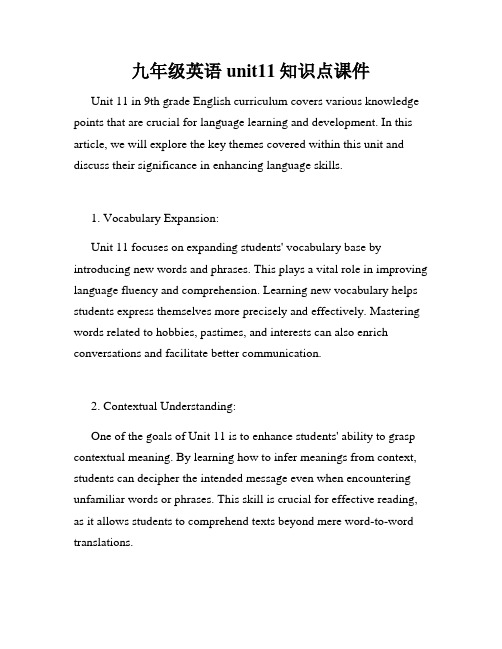
九年级英语unit11知识点课件Unit 11 in 9th grade English curriculum covers various knowledge points that are crucial for language learning and development. In this article, we will explore the key themes covered within this unit and discuss their significance in enhancing language skills.1. Vocabulary Expansion:Unit 11 focuses on expanding students' vocabulary base by introducing new words and phrases. This plays a vital role in improving language fluency and comprehension. Learning new vocabulary helps students express themselves more precisely and effectively. Mastering words related to hobbies, pastimes, and interests can also enrich conversations and facilitate better communication.2. Contextual Understanding:One of the goals of Unit 11 is to enhance students' ability to grasp contextual meaning. By learning how to infer meanings from context, students can decipher the intended message even when encountering unfamiliar words or phrases. This skill is crucial for effective reading, as it allows students to comprehend texts beyond mere word-to-word translations.3. Grammar Structures:Unit 11 introduces several essential grammar structures. Students study the present perfect tense, which is commonly used to express experiences and actions that have occurred in the past but have a connection to the present. Understanding and utilizing this tense empowers students to articulate their thoughts more accurately and convey a timeline of events correctly.4. Sentence Variation:Unit 11 also emphasizes the importance of sentence variation. Students are encouraged to diversify their sentence structures by using different sentence types, such as simple, compound, and complex sentences. This skill ensures more engaging and coherent writing, promoting effective communication and demonstrating linguistic creativity.5. Speaking and Listening Skills:Unit 11 provides various opportunities for students to develop their speaking and listening skills. Engaging in conversations about hobbies, interests, and aspirations allows students to practice active listening and oral expression. Collaborative activities, such as role-plays and group discussions, foster a supportive learning environment that encourages students to articulate their thoughts confidently.6. Cultural Insights:Aside from language development, Unit 11 also introduces students to different cultures and encourages cultural appreciation. By exploring hobbies and interests from various countries, students gain insight into global diversity and foster respect for different lifestyles. This promotes intercultural understanding, which is crucial in an increasingly interconnected world.7. Critical Thinking:Unit 11 incorporates critical thinking exercises to stimulate students' analytical and problem-solving skills. By engaging in activities that require them to evaluate and extract relevant information from texts, students enhance their cognitive abilities. This fosters independent thinking and encourages students to approach challenging tasks with confidence.8. Reflective Writing:Unit 11 incorporates reflective writing tasks that encourage students to introspect and express their thoughts and feelings. Reflective writing enables self-awareness and enhances emotional intelligence, allowing students to explore their interests, strengths, and areas for improvement. This promotes personal growth and self-expression.In conclusion, Unit 11 of the 9th grade English curriculum encompasses various knowledge points that are essential for language development. By focusing on vocabulary expansion, contextual understanding, grammar structures, sentence variation, speaking and listening skills, cultural insights, critical thinking, and reflective writing, students can enhance their language fluency and overall communication abilities. These skills not only empower students in English but also equip them with valuable tools for success in their personal and professional lives.。
人教新目标版九年级英语全册 教学课件 Unit 11 第1课时

excited
annoyed tired/sleepy
happy
unhappy
sad
annoyed
angry
bored
nervous
tense
stressed out
surprised
excited
energetic
relaxed
tired
sleepy
comfortable uncomfortable scared
Tina: She said that loud music made he tense. John: That’s strange. Loud music always makes me excited and want to dance. Tina: Me too. John: So then you went to the Blue Lagoon as usually, didn’t you? Tina: yes, you guess right. John: It was quiet and the food was great there. Did you have a good time there? Tina: Yes, we did. John: Where did you go then?
∨_ Waiting for her made angry. ∨_ She said that loud music made her tense.
_ Loud music makes me happy.
∨_ Loud music always makes me want to dance. ∨_ It was so sad it made us cry. ∨_ Sad movies don’t make me cry.
辽师大版小学五年级英语上册Unit11精品课件

辽师大版小学五年级英语上册Unit11精品课件一、教学内容本节课,我们将在辽师大版小学五年级英语上册Unit 11中深入探索。
具体内容包括:第一部分,学习新词汇和短语,如“singer”, “dancer”, “draw pictures”等;第二部分,掌握一般现在时肯定句和否定句构成;第三部分,理解并运用目标句型“Do you like?”和“Yes, I do./ No, I don't.”。
二、教学目标1. 学生能够听懂、会说、会拼写新词汇和短语。
2. 学生能够运用一般现在时描述自己兴趣爱好。
3. 学生能够运用目标句型进行交流,询问和回答他人喜好。
三、教学难点与重点难点:一般现在时肯定句和否定句构成,以及目标句型运用。
重点:新词汇和短语学习,以及一般现在时运用。
四、教具与学具准备1. 教具:PPT课件、实物(如乐器、画笔等)、单词卡片。
2. 学具:课本、练习本、彩色笔。
五、教学过程2. 新课内容展示:a. 学习新词汇和短语,让学生跟读并模仿。
b. 引导学生观察图片,运用一般现在时描述图片中活动。
c. 学习目标句型,并进行角色扮演,进行实际交流。
3. 例题讲解:通过PPT展示例题,引导学生分析并解答。
4. 随堂练习:学生完成练习册上题目,巩固所学知识。
六、板书设计1. 新词汇和短语:singer, dancer, draw pictures, play chess, like, do, don't等。
2. 句型:Do you like? Yes, I do./ No, I don't.3. 例题:一般现在时肯定句和否定句。
七、作业设计1. 作业题目:a. 写出本节课所学5个新词汇和短语,并造句。
A: Do you like playing chess?B: ____________. I like ____________.2. 答案:a. 略。
b. Yes, I do./ No, I don't. playing chess/ singing/ dancing/ drawing pictures等。
英语教学PPTUnit 11
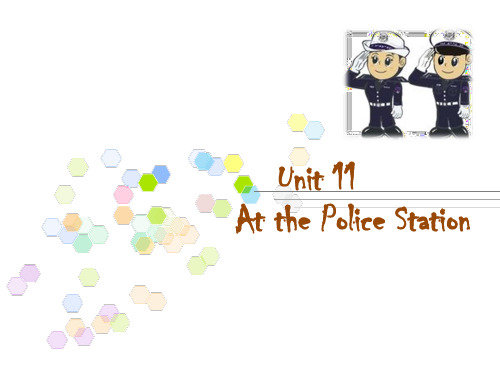
Scene Simulation
(二)听取录音,根据所听到的内容补全对话,并与你的 同学进行口头互动模仿练习。本段对话读一遍。
W: Officer! Please help me! M: Yes, ma’am. Don’t worry. Please _____________
Scene Simulation
现在听录音,检查你的答案。
4. 是这个人偷了你的相机吗?
Is it the person who stole your camera?
5. 你昨天就报案了,不是吗? You reported it to the police yesterday, didn’t you?
and tell me what happened. W: Somebody just _____________! On the bus!
When I _________________! M: All right. Calm down, please. Here is some water.
Now, please tell me what was in your bag. W: There was ________, several credit cards, my ID
card, and ______________!
Scene Simulation
(二)听取录音,根据所听到的内容补全对话,并与你的 同学进行口头互动模仿练习。本段对话读一遍。
M: Did you see the __________________ that took your bag?
英语教学课件unit 11
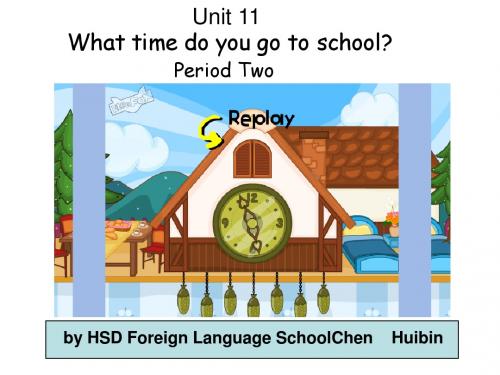
What do they usually do at 8:00 pm/ 20:00?
What do they usually do at 8:00 pm/ 20:00?
They usually watch TV at ...
watch evening/ morning TV
What does the baby do at 8:00?
What does the baby do at 8:00?
She brushes her teeth.
What do they usually do at 8:00 pm/ 20:00?
What do they usually do at 8:00 pm/ 20:00?
They usually run at… What a funny time to run !
works long hours What is his job?
2
1
4
3
What does Scott usually do every day? Please list the actions out in order. in the in the morning afternoon/evening 1. gets up 6. gets home 2. brushes his teeth watches morning 7. has/takes a shower TV 3. eats his breakfast 8. goes to bed 4. plays the guitar 5. goes to work
Retell the story
Scott usually gets up at 17:00.
Unit 11 Reading-20180930113949627-3119f9b7-cbab-4f

2005 年 12 月 21 日
Step 2
Unit 11 The sounds of the world Pre-reading & reading New 课型 1. Improve students’ reading ability. 2. Help students’ learn more about the world-wide music. 3. Master some useful phrases and expressions. 1. Improve students’ reading ability. 2. Help students’ learn more about the world-wide music. Master some useful phrases and expressions. The Ss can finish the task. But there may be a little difficulty in listening. 1. A recorder 2. A projector 3. A computer 4. a toothpick, a sock & a plastic bag etc. Communication 教学内容(引入、例题、练习题、检测题等) 师生 活动 Revision 1. Fill in the blanks Our earth is made up of the Indian Ocean, the Atlantic Ocean, the Pacific Ocean and the Arctic Ocean. It consists of seven continents, which are North America, South America, Europe, Asia, Africa, Oceania and Antarctic. So there are many different kinds of music in the world, that is to say, there are a variety of music in the world. Music is a universal language and even people don’t understand the words, they can still enjoy the rhythm and beautiful sounds produced by Do exx & different musical instrument. explai 2. Language points n vary v. 变化 various adj. 各种不同的 variety n 变化,多样性 a variety of / varieties of 种类繁多的 The girls come from a variety of different backgrounds. 3. Practice 1)这个购物中心出售许多种商品。 The shopping-centre sells a variety of goods. 2)我们有大量不同种类的品种供选择 We have a great / large / wide variety of patterns to choose from. 3)every variety of form 各种形式 for a variety of reasons 因种种理由 for variety's sake 为了不单调起见 in a variety of ways 用种种方法 Reading 1. Pre-reading 1) What kind of music do you like best? Why? 2) Do you know the difference among different kinds of music? 3) When you listen to a song, do you listen to the words or the music? 2. Fast-reading 1) What is the passage about? Read It’s a brief look at some of the exciting musical styles from around the world. & answe 2) How many musical styles are introduced in the text? What are they? er Six. They are blues, jazz, rock music, hip-hop, rap, Latin music. 3) What does “sound” mean in the title? And why does the author use “sounds” here? “Sound” means music. “Sounds” means many different kinds of music. 4) What does the American music contain? Blues, jazz, rock, hip-hop and rap. 5) Can you say the names of the two stars of Latin music mentioned in the passage? Santana and Ricky Martin. 3. Scanning 1) What’s the main idea of each Para? Para1: There is a world of music out there. Para2: Blues music has a long history.
unit 11 全单元课件word版(教师用)(人教版高三英语下册教案教学设计)

ListeningI. Some important words in the listening:1) survey questionnaire comments observation majority protest motive2) percentage frequency chartII. pre-question: How do you spend your time after school?III. listeningEx.1. listen to the tape and ask them to decide T or Fa. The survey was conducted among 400 foreign university students. ( T )b. The questionnaire has only one section. (F) para2c. 81% of the students complained about the homework and 44% said theyhad part-time jobs. (F) para3d. The second part or the questionnaire was filled out by student who had apart-time job. (T) para4e. The number of the students looking for jobs is decreasing. (F) para5Ex. 2 The listening is a summary of research into the ways Chinesestudents in Auckland spend their leisure time. Listen to the tape andfillin the most important percentage mentioned in the text in the chart.the answers are in the para3.While listening, students must keep figures(percentage) and the frequency(how much time is devoted to various activities)Frequency Doing homework Going to the cinema Going shopping Doing nothing at allNoneHardlyLittleSometimes 69% 75% 56%MuchMost 62%All 25% (1/4)Ex.3 Listen to the para4 and draw a pie chart of the things working studentsspend their money on. (On the textbook, P 92 ,Ex.3)the answer is in the para 4Ex. 4 Fill in the blanks with the missing words.The second part of the questionnaire was only filled out by students who had a part-time job. Most of them (94%) said that it had been easy tofind a job, with 60% saying this was their first job. 81% said thattheir parents had protested, but given in on the condition that their school results would not suffer. All students said that the greatest advantage of having a part-time job lay in having more money, though 23% of the students said working with and getting to know other people was something they enjoyed. Asked what they use the money for, students mentioned various free-time occupations, as described in part one of the survey. Of all other things they spend their wages on, the mostimportant were phone calls(40%), followed closely by clothes and makeup (35%) and going out (15%). Only 10% of the students said they put away money in a savings account.The results of the survey seem to suggest that Chinese students abroad have little time for part-time jobs. They spend most of their free time doing homework. However, an increasing number of students look for jobs. They seem to enjoy it, and are able to combine it with their school work. While the majority of the students said the main motive to look for ajob was money, about one fifth of the students enjoyed contacts and getting to know people in a different setting, away from school.Reading : Making the team workI. Match the main idea with each partPart1 (para1-2) a. What is a team.Part2 (para3-4) b. sports teamPart3 (para5) c. Working in groups at school is an opportunity to learn about teamwork.Part4 ( para6) d. How can group work be successfulPart5 (para7) e. Different members in the teams can occupy different jobs.Part6 (para8-10) f. How to make teams function well.II. Fast-reading questions:1. What is a team?A team is a group of individual people brought together in order to accomplish a task that cannot be efficiently of effectively completed by an member of the group alone. ( Para. 2)2. What is the function of group work?Group work makes us aware of the role that is most suitable for each of us, bring the benefit of getting experience working with other people, show us h ow other people’s roles fit the purpose of the group and teaches us to be patient and how to respect to different personalities. (para5)3 According to the author, what are requirements for teams to function well?All team members should respect each other, have clear roles, support and help each other. (para6)4. How are the tasks of the group divided?The tasks of the group are divided depending on the personalities and abilities of the individuals in the group. (para8)5. How can we make the best of working with our classmates?We should recognise their strengths and weaknesses. Their differences are the strength of the team. Knowing other people’s shortcomings can help us avoid embarrassing them. (para9)III. careful- readingA. True or False1. In a sports team, the coach must be a member of the team. (F) para32. In sports teams, group work can be successful when members respect, help and support each other. (T) para63. Sports teams require leaders, people to create ideas, people to develop ideas, people to do practical work, people to comment on and improve ideas, people to identify and solve problems, and people to suggest solutions. (T) para74. Only rules and regulations can help teams function well. (F) para85. Only people with the same personality work well together. (F) para96. The author thinks the statement that some team members work best in tasks alone is contradictory. (F)B. Choose the best answers:1. In sports games , a player _______ . BA. often changes his roleB. has a clear roleC. feels that players with different abilities make different contributions to the teamD. accepts the same expectations and responsibilities as the other players2. The author takes _____ for example to show how a team can work well AA. the sports teamB. the project teamC. the rugby teamD. a dynamic team3.In order for a team to function well , people of the team must ______ . DA. respect each otherB. co-operateC. obey necessary rules and regulationsD. all the above4.Group work at school is important to students because _______ . DA. it is an opportunity to learn more about team workB. it brings the benefit of getting experience working with othersC. it teaches us to be patient and how to respond to different personalitiesD. it is a preparation for our working days to come5.Why it is important in a team to know someone’s personality type and ability ? DA. We can know a great deal about that personB. Lack of recognition of differences in human function can be avoidedC. We can build strong and good relationships between members of a teamD. Both B and C6.What is the main idea of Paragraph 7 ? CA. How a project team is different from a rugby teamB. How a project team worksC. In a project team , people who have different abilities and personalities have different roles in the teamD. How the tasks of the group are divided depends on personalities and abilities of the individuals in the group7. In the whole text , the author mainly talks about _______ . AA. the elements that make the team workB. the importance of social relationships within a teamC. the roles that different people of a group playD. the comparison between a project team and a rugby team8.According to the text , which of the following statements is notright ? AA. The coach of a sports team is not counted as a team member , so he is less importantB. Social relations are important within the teamC. The atmosphere in the group affects the performance of the teamD. It’s not necessary for all team members to be friends9. We can infer from the test that ______ . BA. the players in a rugby team should co-operate while the people in a project team needn’tB. the players in a rugby team have clear roles while people in aproject team may not haveC. the coach of a rugby team discusses strategy and makes decisions while the leader of a project team doesn’tD. the coach of a rugby team is important while the leader in a project team may not be as importantC. further understanding1) Try to compare the rugby team with the project teamSimilarities 1. They are both teamwork.2. All team members should respect, help and support each other.3. The tasks of the teams should be divided according to the personalities and abilities of the team members.DifferencesProject team Rugby team1. Team members may combine roles. 1. the work division is clear and each player has a clear role.2. The number of players is changeable. 2. The number of players is not changeable.3. The purpose is to build buildings. 3. The purpose is to win a match.IV. Phrases:1. for the sake of.. =for one’s sake 为了…,由于,看在…的份上2. in reality 实际上prar2:3. bring together 组合,集合para3:4. common goal 共同目标5. be counted as… 被算作…6. social relation 社会关系7. make an equal contribution 做出同等贡献para4:8. there are no conflicts abou t… 对…没有异议9. be attached to 附属于;将某物系在另一物上;将某物与另一物相联系10. be aware of… 意识到;para5:11. be most suitable for… 对…最适合12. bring the benefit 带来好处13. fit the purpose of… 适合..的目的14. respond to different personalities 应对不同个性的人para6:15. as with=as to =as for 就…而言,至于…16. the work division 分工17. perform at the right level 发挥正常水平18. a project team 项目小组19. combine roles 身兼数职20. bring new energy to… 给…带来新鲜活力21. keep an eye on… 监管,照看;22. compromise in conflicts 在矛盾中协调23. keep peace and harmony 保持平静和谐para8:24. guard against… 防止25. take into account= take into consideration= take account of 对…加以考虑, 顾及para9:26. to make the best of doing… 为了做…到最好;27. strengths and weakness 强弱项,优缺点;para10:28. the lack of recognition of.. 对…认识的缺乏;29. human functioning 人体机能Integrating skills reading: Ticket to SuccessI. Warming -up question:What do you want to do after you graduate from high school?Most of us are studying here aimed at going to universities. Is it the only way to succeed?II. Fast readingLi yonghong made two important decisions in her life. What are they? (Para.1、2)1). Left school and took a one-year training course to become a hairdresser.2). Learnt how to do make-up.III. careful reading1. Read the text quickly and explain what the text is about?The text is about choices in life and careers. It suggests that different people have different talent, and that in order to be successful ,society and people have to make the best of their talent.2. The author distinguished two personality types .What are they?Mental intellectual type and hands-on experiences type3. In order to become successful, what must we do? ( Para. 4、5、6)1). explore your talents and get to know yourself so as to find out where your real interests lie.2). follow what feels right.3). we must make the most of our special talents and interests.4. What are the different learning styles:( Para. 7)1). schools and universities2). to try, experiment and find their way through hands-on experience IV. Phrases:1. have sb./sth.in mind 在想…,计划…bear/keep sb./sth. In mind记住,记…在心里have…on one’s mind 把…挂在心上2. congratulate sb. on/upon (doing) sthcongratulate sb. on one’s marriage/ new job/ good exam results congratulate oneself on/upon (doing) sth认为自己幸运或成功3. manage the finances 管理财务4. put…to go od use5. do make-up 化妆6. tend to 倾向于7. live up to 依照某事物行事,表现出符号某事物的标准eg: fail to live up to his parents’ expectations8. get to know oneself 了解自己9. follow what feels right 跟着感觉走follow your own interest10. make the most of….11..hands-on: practical亲身实践的,实习的12. accommodate sth to sth 适应,迁就,迎合13. in unique way 以独特的方式14. inner processes 内部作用。
- 1、下载文档前请自行甄别文档内容的完整性,平台不提供额外的编辑、内容补充、找答案等附加服务。
- 2、"仅部分预览"的文档,不可在线预览部分如存在完整性等问题,可反馈申请退款(可完整预览的文档不适用该条件!)。
- 3、如文档侵犯您的权益,请联系客服反馈,我们会尽快为您处理(人工客服工作时间:9:00-18:30)。
Now let’s try.
√
Could you please sweep the floor?
Yes, sure.
×
Could you please take out the trash?
Sorry,I have to do my homework.
PAIRWORK
1c,look at 1c and then make conversations with the following pictures after 1c.
请求
Well,Let’s make polite requests .
If you can, you say
⒈Yes, sure.
2.Of course. √
3.Certainly.
...
⒈sorry, I can’t. +reason
× If you can’t, you say ⒉Sorry, +reason
sweep the floor
cut grass
water the flowers pick oranges
v.(浇水)
Look at 1a at first then answer my question.
What chores do you often do?
I am going to have a party. I need to do the following things. Could you please help me?
Revission
What are you going to be when you grow up?
How are you going to do it ?
肯定句 Could…please +∨原型
否定句 Could…please not+∨原型
Do exercise:
⒈Could you please sweep the floor? ⒉could you please take out the trash?
×
fold the clothes
√ make the bed
×
make meals (breakfast/lunch/supper)
do the dishes
=wash the dishes √
clean the living room × sitting room
1b,listen.What kinds of chores do Peter and his mother
⒊Could you please do the dishes?
⒋Could you please make the bed?
New words:
Let’s learn the new words at first.
look
listen read write
Look at these pictures of chores . What chores do/does she/he/they often do?
√ do?Check Peter’s mother or Peter.
Chores
Peter’s mother
Peter
do the dishes
√
sweep the floor
√
take out the trash
√பைடு நூலகம்
make the bed
√
fold the clothes
√
clean the living room
√
SUMMARY
1. could …please…?
2.expressions
3.make conversations with target language.
4.Listening training
Homework Make three conversations after 1c.
